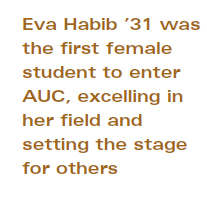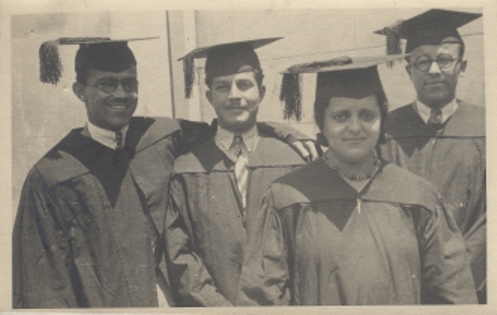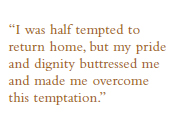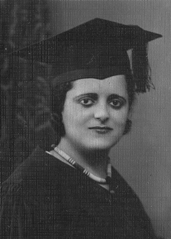
The late Eva Habib el Masri
was a pioneer in multiple
facets of her life. As the first
female AUC student, she was
valedictorian of her class and opened
the doors for all of the female students
attending the university today. Habib's father was a respected government official. In addition to being appointed secretary general of the senate following independence in 1924, he worked in the Ministry of Finance and received the title of pasha from King Farouk for distinguished service to his country. Educated in American schools and universities throughout her life, Habib began at the American Mission College for Girls in Cairo. She attended the college between the ages of 4 and 16, eventually graduating in 1928 with the highest average grade in her class for the final three years, which granted her first prize. During her return visits to the college in the summer, she met a teacher who suggested that she apply to AUC, saying that she would be the perfect pioneer because of her academic record. She presented the idea to her father that summer, who put all of his support behind her. Her father allowed her to enroll at AUC because he believed that education was an end in itself, not just a means to an end."I am giving her the joy and the pride of being a pioneer in the field of coeducation, which is coming to Egypt as certainly as the rising sun comes every morning," he said, as Habib documented in her memoirs. |

|
|
Habib and her father went to meet
with Charles Watson, president and
founder of AUC. Upon reviewing the
laws and statutes of the university, they
found that there was nothing in
writing that prohibited women from
enrolling, and in the fall of 1928,
Habib was admitted to AUC.
Her outstanding work at the mission college enabled her to enroll as a sophomore at AUC. She studied the social sciences (sociology, economics and social psychology) and the natural sciences (organic chemistry, physics, geology and astronomy). Of these, she preferred astronomy because it allowed for class trips to the Helwan Observatory. She also studied speech, literature and philosophy, and took an elective course in journalism her first year, which led to her involvement in the AUC Review (today's Caravan), of which she became editor in chief as a senior. She was also a member of the Cosmopolitan Club and played the piano for the Glee Club. Habib excelled at AUC, winning the annual spelling contest and receiving the highest grades in all of her classes, leading her to being named valedictorian at the June commencement of 1931. "My commencement day . was a memorable day," she wrote in her memoirs. "As long as I live, I will remember it with a feeling of great joy. . I was the star of the day. I was valedictorian and received all the first prizes. . [Feminist leader] Madame Hoda Shaarawi was present, and a few days later called me up to tell me that she was exceedingly glad to see me graduate because I represented the beginning of the realization of her dream, which was that higher education would be made accessible to Egypt's young women."  As editor in chief, Habib met many important visitors, including Ralph Harlow, a professor at Smith College in the United States. Harlow was visiting Cairo on a sabbatical trip through the Middle East, and after a talk at Ewart Hall, he met Habib and encouraged her to apply to Smith College under the foreign students fellowship grant. She followed his advice, became the first Egyptian to join and ended up finishing a master's in sociology in one year at Smith -- an achievement unmatched by any foreign student at that time. Her involvement with the AUC Review propelled her into selecting journalism as one of her careers, and her first major position outside the university was as editor in chief of a bi-weekly magazine called Al- Misriyyah, founded by feminist leader Hoda Shaarawi. She held this position from 1937 to 1942, when the pressures of war forced the closure of the magazine. After the war, Habib married a lawyer from Alexandria,Youssef, and together they traveled to the United States, where she studied at five different universities, eventually settling on a master's in library science. Along with her husband, she became an American citizen and a successful librarian in the New York University Libraries. In her memoirs, Habib acknowledged that she owed much of her success in life to the experience of attending AUC."I have no doubt that had I not gone to AUC, all the opportunities that came across my way and that have been recorded in the previous chapters, would not have come about," she said. By Jeffrey Bellis |
